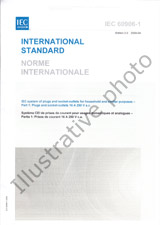We need your consent to use the individual data so that you can see information about your interests, among other things. Click "OK" to give your consent.

IEC/TS 62804-1-ed.1.0
Photovoltaic (PV) modules - Test methods for the detection of potential-induced degradation - Part 1: Crystalline silicon
STANDARD published on 6.8.2015
The information about the standard:
Designation standards: IEC/TS 62804-1-ed.1.0
Publication date standards: 6.8.2015
SKU: NS-613097
The number of pages: 15
Approximate weight : 45 g (0.10 lbs)
Country: International technical standard
Category: Technical standards IEC
The category - similar standards:
Annotation of standard text IEC/TS 62804-1-ed.1.0 :
IEC TS 62804-1:2015(E) defines procedures to test and evaluate the durability of crystalline silicon photovoltaic (PV) modules to the effects of short-term high-voltage stress including potential-induced degradation (PID). Two test methods are defined that do not inherently produce equivalent results. They are given as screening tests; neither test includes all the factors existing in the natural environment that can affect the PID rate. The methods describe how to achieve a constant stress level. The testing in this Technical Specification is designed for crystalline silicon PV modules with one or two glass surfaces, silicon cells having passivating dielectric layers, for degradation mechanisms involving mobile ions influencing the electric field over the silicon semiconductor, or electronically interacting with the silicon semiconductor itself.
We recommend:
Updating of laws
Do you want to be sure about the validity of used regulations?
We offer you a solution so that you could use valid and updated legislative regulations.
Would you like to get more information? Look at this page.



 Cookies
Cookies
